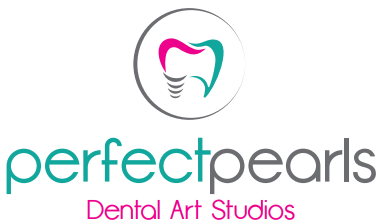- Home
- Advanced Teeth Whitening
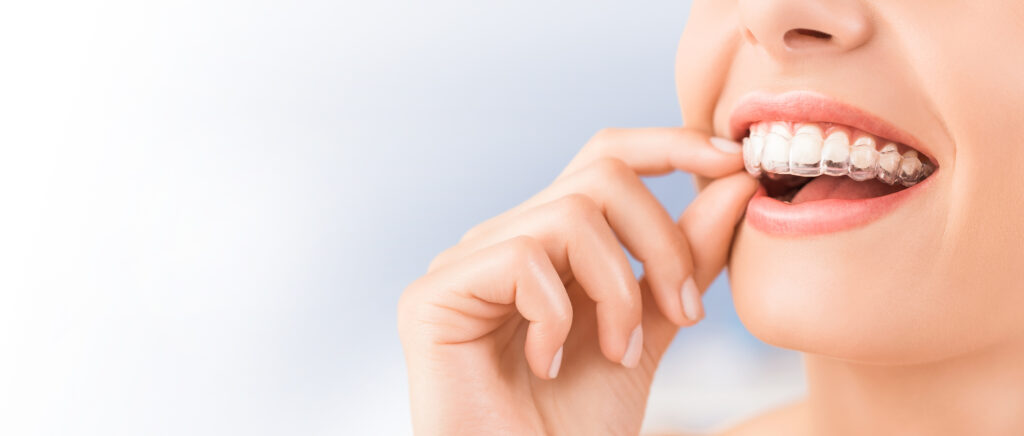
A radiant smile can significantly enhance your confidence and overall appearance. At Perfect Pearls in Wolverhampton, we understand the importance of a beautiful smile. That’s why we offer advanced teeth whitening services, a highly effective method of lightening the natural colour of your teeth without removing any of the tooth surfaces.
Understanding Advanced Teeth Whitening
Advanced Teeth Whitening is more than just a cosmetic treatment; it’s a personalised journey to achieving the smile of your dreams. Unlike standard whitening options, our Advanced Whitening at Perfect Pearls is designed to suit your unique lifestyle and desired results. We always ensure that our services are tailored to your specific needs.
If you’re struggling to find the time in your busy schedule to visit the dentist, this option could be perfect for you. You’ll be able to whiten your teeth using professional treatments in the comfort of your own home. Plus, the fast-acting, 6% hydrogen peroxide formula guarantees great results with just 90 minutes of daily use.
- Highest strength for rapid results
- pH neutral gels to protect teeth
- £249 including professional trays
- Noticeable improvement in days
The process of Advanced Teeth Whitening
- Your dentist will examine your teeth and gums to make sure your teeth are ready, restore any cavities and take moulds for your bespoke whitening trays.
- Your unique mould is sent to the laboratory where the Advanced Teeth Whitening technicians will precision manufacture whitening trays to fit your mouth very precisely.
- Collect your trays from us and start using them at home with the whitening gels.
- In two to three weeks, you can unveil your beautiful new smile.
Whiten your teeth at home
For just £249, you can whiten your teeth from the comfort of your own home. Get in touch today to find out more, and start your journey to a brighter, whiter smile.
Enquire today
Why choose Perfect Pearls for your whitening needs
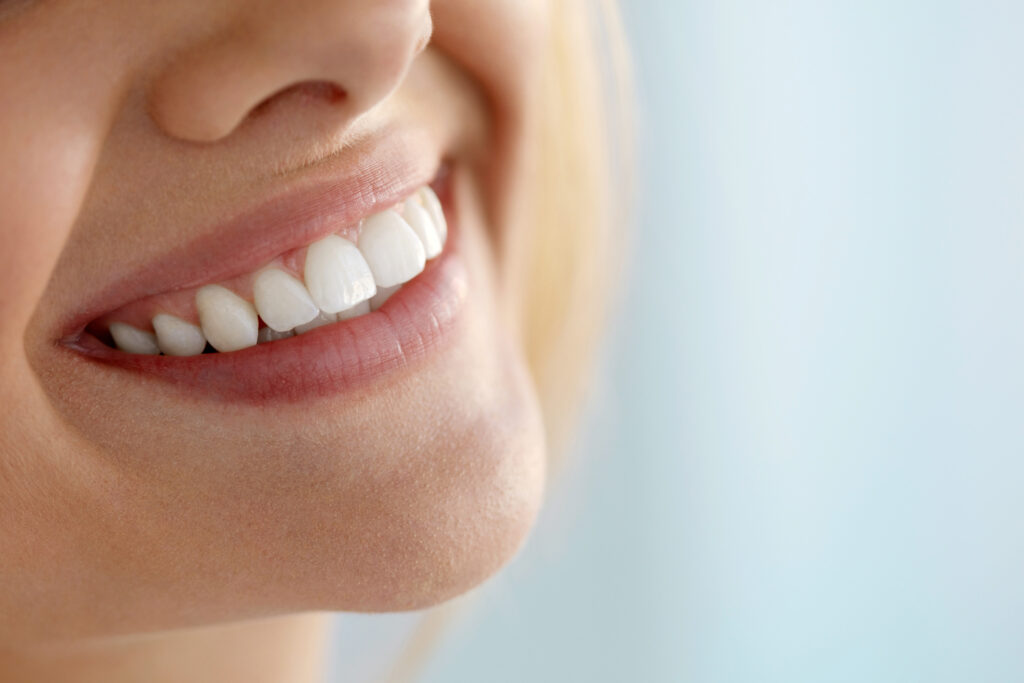
At Perfect Pearls, we pride ourselves on our expertise in Advanced Teeth Whitening. Our team is dedicated to providing a comfortable, safe, and effective whitening experience. With our state-of-the-art technology and personalised care, we ensure that your journey to a brighter smile is smooth and satisfying.
Caring for your smile post-whitening
Once you have your brighter, whiter smile, efforts should be taken in order to maintain it for as long as possible. To do this there are three main things to consider after completing your whitening treatment:
- Practising good oral hygiene is essential in keeping your teeth clean and free from surface stains on a daily basis. Brushing morning and night at least twice a day is recommended and even after any meals or drinks which may cause stains. Replacing your current toothpaste for one made to whiten teeth may also help to keep your teeth whiter for longer.
- Avoid any foods and drinks that will cause staining to your teeth. These include wine, coffee or sports drinks just to name a few. You can still enjoy them from time to time but moderation will help to maintain your brighter smile.
- Follow up treatments will be required to ensure your teeth remain bright and white. The frequency of these will depend on the factors above and how well you look after your smile. Whitening at home after in-practice treatment can be a great way to ensure your smile stays bright and white.
“The dentist Sanjeev checked my teeth to make sure everything was ok before I started the treatment, he explained the process clearly, the dental nurse Jodie made me feel at ease and the reception staff were very friendly, I had a great first experience and will be returning for more treatment, highly recommend!”– Stuart D
What other teeth whitening options do we offer?
We also offer Philips Zoom! one hour treatment. Our in-chair Philips Zoom! treatment is one 60 minute session consisting of 4 x 15 minute whitening sessions, a scale and polish beforehand and a free consultation.
- One 60 minute visit
- In-chair teeth whitening
- £499 including scale & polish
- Adjustable intensity settings
At Perfect Pearls in Wolverhampton, we are committed to providing you with a bespoke teeth whitening experience that is safe, effective, and tailored to your needs. Whether it’s for a special occasion or a confidence boost, our Advanced Teeth Whitening service is designed to give you the radiant smile you’ve always wanted. Contact us today to start your journey towards a brighter, more confident smile or call 01902 500 823.
Get in touch
- Home
- Revolutionising Dental Implant Treatments with our CBCT Scanners
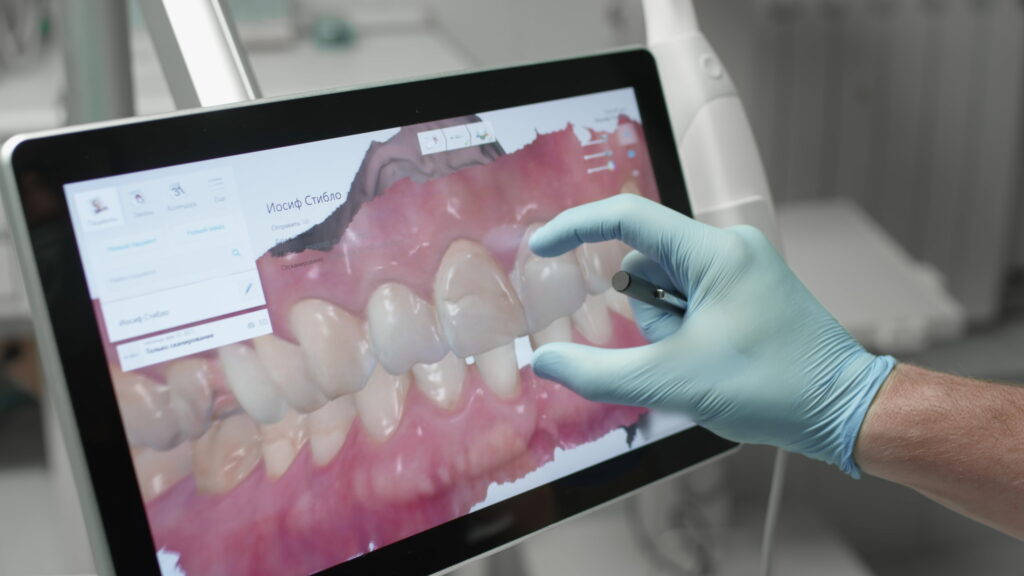
At Perfect Pearls, we are always on the forefront of the latest technological advancements, ensuring we provide our patients with the highest standard of care. Central to our commitment is the utilisation of our cutting-edge CT scanner, particularly the Gendex CT scanner, a device specially designed for dental applications.
This advanced CT scanner, specially designed for dental use, employs Cone Beam CT (CBCT) technology to produce a detailed 3D image of your mouth. Read on to find out how we employ this state-of-the-art tech and its implications for those considering dental implants.
What are CBCT Scans?
CBCT scans are a type of X-ray equipment that produces three-dimensional images of your teeth, soft tissues, nerve pathways, and bone in a single scan. Unlike traditional X-rays, CBCT scans offer a more comprehensive view of the dental structures, allowing for precise and accurate planning and execution of dental procedures.
Understanding the Importance of Jawbone Health
The foundation of a successful dental implant is the quality and strength of the bone in your jaw. When a tooth is lost, the bone in that area can begin to diminish over time. This bone loss can pose challenges for implant placement and can even affect the final results, be it a crown, bridge, or denture.
At Perfect Pearls, we never compromise. Before proceeding with dental implant treatment, we always ensure there’s sufficient bone to support the implant. If there are concerns about bone levels, we’ve got solutions—be sure to check out our Bone Grafting information to discover how we can augment bone levels if necessary.
Benefits of Using CBCT Scans in Dental Implant Treatments
Are you concerned about bone loss? This is where our Gendex CT scanner comes into play. The benefits include:
Dental-specific design: Our Gendex CT scanner is crafted explicitly for dental applications, ensuring optimal results.
Precision imaging: With its ability to generate an accurate 3D image of your mouth, we can assess the intricacies of your bone structure and dental anatomy.
Informed planning: The scanner’s 3D imaging capability enables our implant specialists to meticulously plan the best placement for dental implants and the subsequent prosthetic.
Avoiding implant failures: With such precise imaging, we can preemptively address potential issues, significantly reducing the risk of implant failures.
Why Digital Dentistry Matters
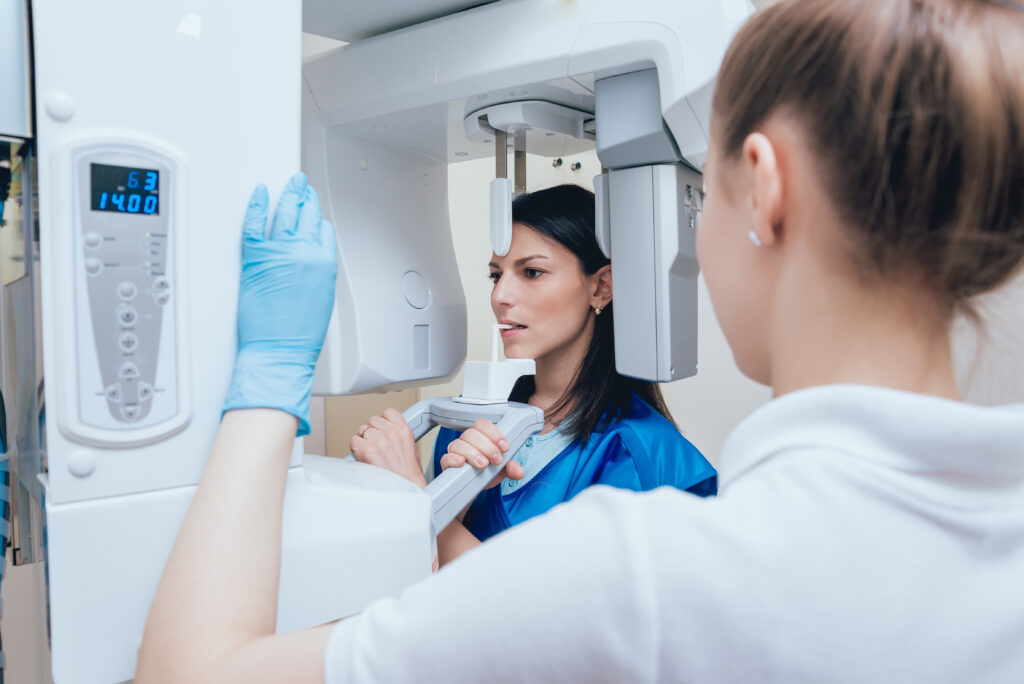
The world is moving at a fast-paced digital evolution, and the dental realm is no exception. Digital dentistry, characterised by tools like CBCT scans, not only enhances the dental procedure itself but also vastly improves the patient experience.
- Digital scans can be more comfortable than traditional methods, alleviating some of the anxieties many patients feel.
- Efficiency: With digital tools, you’ll spend less time waiting and more time enjoying their rejuvenated smiles.
- CBCT scans expose patients to minimal radiation, ensuring safety without compromising on quality.
At Perfect Pearls Dental, our priority is ensuring you’re well-equipped with information and confident in the treatment options available. During our complimentary dental implant consultations, we delve into the potential avenues for your dental health, ensuring you’re knowledgeable and comfortable with the proposed process.
Experience the difference that cutting-edge technology and compassionate care can make. Curious to know more? Reach out to us via our online form or call us directly at 01902 500823. We’re here to guide you every step of the way.
- Home
- How long do dental implants last?
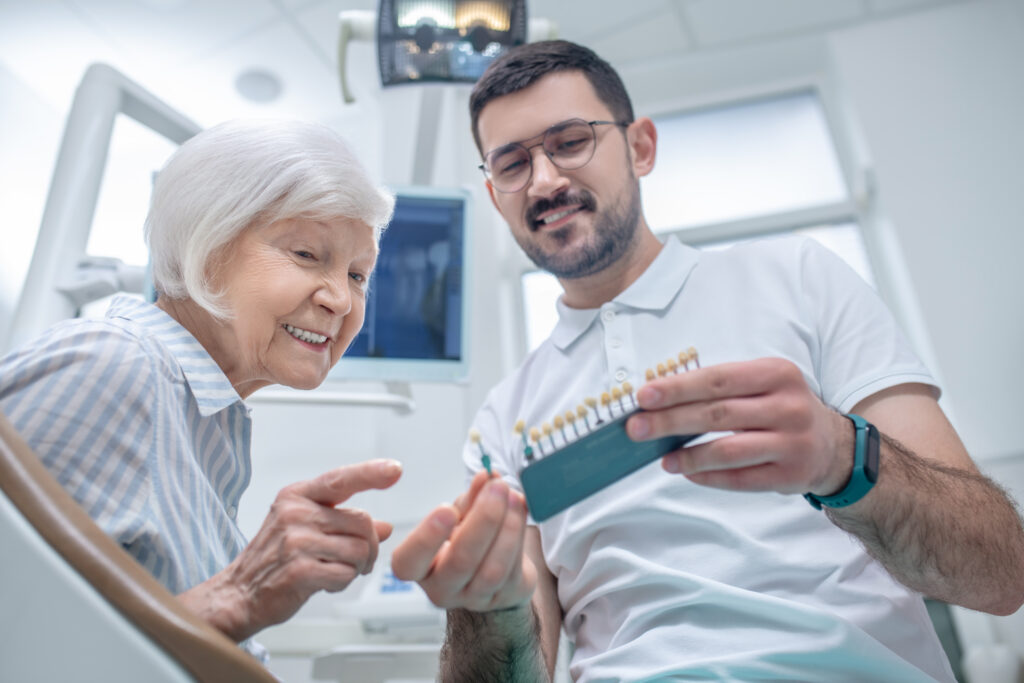
Welcome to Perfect Pearls Dental Practice, where we strive to ensure your smile is as radiant as pearls. Today, we are here to delve into one of the most popular and transformative dental procedures – Dental Implants.
One of the most common questions we receive is, “How long do dental implants last?” Let’s uncover the layers to this question in this blog post, and discuss the benefits of getting dental implants.
What are dental implants?
Millions suffer from tooth loss due to decay, gum disease, or injury. The absence of teeth can significantly impair function and aesthetics, affecting one’s ability to chew food properly and smile confidently. It is a daunting experience, leaving many searching for a lasting solution.
Enter Dental Implants! Dental implants serve as a permanent solution to missing teeth, providing a strong, stable foundation for artificial teeth. These marvels of modern dentistry integrate seamlessly with the jawbone, acting as a new root for the replacement tooth and delivering a natural look and feel.
How long do dental implants last?
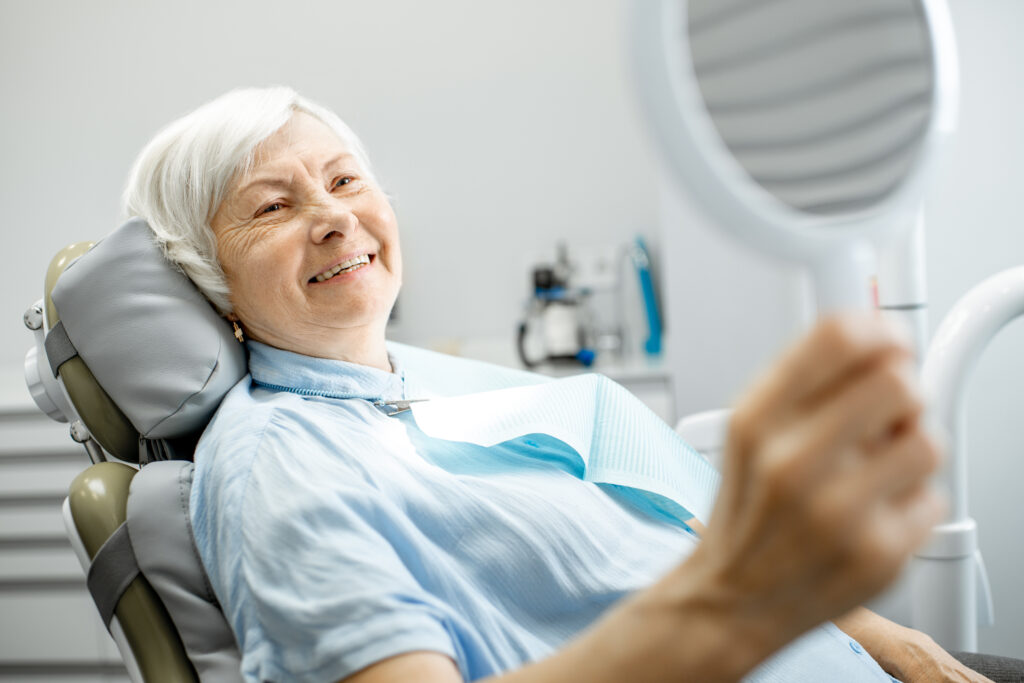
Not only do dental implants resolve the pain points associated with missing teeth, but they are also renowned for their durability and longevity. With proper care and maintenance, dental implants can last for 25 years or more. In many instances, they are a lifelong solution, alleviating the distress and inconvenience of tooth loss permanently. This longevity ensures uninterrupted smiles, the freedom to enjoy all types of foods, and renewed self-confidence.
However, the lifespan of dental implants depends significantly on various factors:
- Oral Hygiene:
Maintaining optimal oral hygiene is paramount. Regular brushing, flossing, and professional cleanings help in preventing infections and diseases around the implant area, thus extending the lifespan of the implant.
- Lifestyle Choices:
Healthy lifestyle choices, such as a balanced diet, limited alcohol consumption, and abstaining from smoking, contribute positively to the longevity of dental implants. Smoking, in particular, can compromise blood flow to the gums and can impair the success of implants.
- Regular Dental Check-ups:
Routine check-ups and professional cleanings allow for early detection and management of any potential issues, ensuring the longevity of the implant.
- Quality of Material and Procedure:
The quality of the implant material and the expertise of the dental professional play critical roles in determining how long the dental implants will last. At perfect pearls dental practice we use quality products, biocompatible materials with evidence based, up-to-date procedures to ensure the longevity of your implants.
- Location of the Implant:
Implants in the back of the mouth receive more strain from chewing, which can lead to faster wear and tear. However, with proper care, they can still last many years.
Tips for maintaining your dental implants
- Brush and Floss Regularly: Use a soft-bristle toothbrush and non-abrasive toothpaste to avoid scratching the surface of the implants.
- Avoid Hard and Sticky Foods: Opt for a balanced diet and try to avoid excessively hard or sticky foods that might damage the implants.
- Wear a Mouthguard: If you play contact sports or grind your teeth at night, consider wearing a protective mouthguard.
- Regular Dental Visits: Schedule regular visits to your dentist for professional cleanings and check-ups.
Living with missing teeth can be a continuous struggle, affecting not only oral health but also overall well-being and quality of life. It can lead to diminished self-esteem, altered speech, nutritional deficiencies due to eating restrictions, and can even impact social and professional interactions. The emotional and physical toll can be overwhelming, making the pursuit of a reliable remedy crucial.
At Perfect Pearls Dental Practice, we pride ourselves on providing high-quality dental care, ensuring your dental implants are placed meticulously and maintained adequately, promising a lifetime of radiant smiles.
For personalised advice on dental implants or to schedule an appointment, get in touch today. Our dedicated team is here to guide you through every step of your dental journey and help you maintain your smile’s brilliance.
- Home
- Cheapest All-On-4 Dental Implants in the UK – Guaranteed!

Perfect Pearls is not just another dental clinic; we are a team of dedicated professionals who have made it our mission to provide the best dental care at the most affordable prices. Our expertise in dental implants and commitment to our patients set us apart from other dental clinics. We understand that the decision to get dental implants is a significant one, and we are here to support you every step of the way.
Read on to find out more about our all-on-4 dental implants.
Why choose All-On-4 dental implants?
The All-On-4 dental implant technique is a revolutionary approach that allows us to replace a full arch of teeth using only four implants. This technique offers several advantages:
- Less invasive: The All-On-4 technique requires fewer implants than traditional methods, making the procedure less invasive and reducing the healing time.
- Cost-effective: With fewer implants needed, the All-On-4 technique is more cost-effective than traditional full arch replacement methods.
- Immediate results: The All-On-4 technique allows us to place temporary teeth on the same day as your surgery, so you can leave the clinic with a full set of teeth and a restored smile.
- Preserves bone: The All-On-4 technique utilises the available bone optimally, reducing the need for bone grafting procedures.
Customised treatment plan
At Perfect Pearls, we believe in providing personalised care to each of our patients. During your consultation, our dental professionals will conduct a thorough examination and discuss your specific needs and concerns. Based on this assessment, we will create a customised treatment plan that addresses your unique situation and provides the best possible results.
Affordable financing options

We understand that the cost of dental implants can be a concern for many patients. At Perfect Pearls, we are committed to making dental implants accessible and affordable for everyone. We offer a variety of financing options to fit your budget, and our team will work with you to find a payment plan that suits your needs.
State-of-the-art facilities
Our clinic is equipped with the latest technology and state-of-the-art facilities to ensure that you receive the highest quality of care. From advanced diagnostic equipment to the latest in implant technology, we have invested in the best to provide the best.
Experienced and caring team
Our team of dental professionals is experienced, skilled, and committed to providing compassionate care. We understand that the prospect of dental implants can be daunting, and we are here to answer all your questions and address any concerns you may have.
Your journey to a new smile
Your journey to a new smile begins with a comprehensive consultation at Perfect Pearls. During this appointment, our dental professionals will conduct a thorough examination, discuss your specific needs and concerns, and create a customised treatment plan. Once you are ready to proceed, we will schedule your implant surgery.
On the day of your surgery, our team will make sure you are comfortable and well-informed about the procedure. The All-On-4 technique typically requires only one surgery, during which the implants and temporary teeth are placed. After the surgery, there will be a healing period during which the implants will fuse with your jawbone. Once the healing is complete, we will place your permanent teeth.
Throughout the entire process, our team will be here to support you and ensure that you have a positive experience. We are committed to helping you achieve a beautiful, functional, and confident smile.
Perfect Pearls is the trusted name for affordable All-On-4 dental implants in the UK. With our experienced team, state-of-the-art facilities, and commitment to patient care, we are here to help you restore your smile and your confidence.
Get in touch today to schedule a consultation and take the first step towards a brighter, healthier smile.
- Home
- Emergency dentist in Wolverhampton

Experiencing a dental emergency can be incredibly stressful, especially when you’re unsure where to turn. If you’re in need of emergency dentistry, Perfect Pearls in Wolverhampton provides not just professional emergency dental care but also a range of cost-effective dental treatments.
Exceptional emergency dental care
Our emergency dental appointments are available for just £60, a competitive rate designed to make immediate dental care more accessible. Our team, led by Sanjeev Ramrakha and Sivakumar, both with years of experience in restorative dentistry, will ensure you’re in safe and skilled hands, even in a dental emergency.
Why might you need emergency dentistry?
It’s crucial to accurately determine the severity of your dental situation. If you find yourself with any of the following symptoms, we strongly advise seeking immediate medical help:
- Uncontrollable, severe bleeding
- Serious injury to your face or jaw
- Swelling in the eye or neck area
- Difficulty in breathing or swallowing due to a dental issue
- These conditions might require more comprehensive medical care, not just dental treatment.
If you’re uncertain about the severity of your situation, you can seek advice from the NHS helpline at 111. They will guide you on whether you need immediate dental care or an emergency room visit. Following their guidance, you can then arrange the necessary appointment.
Low-cost dental care with excellent quality
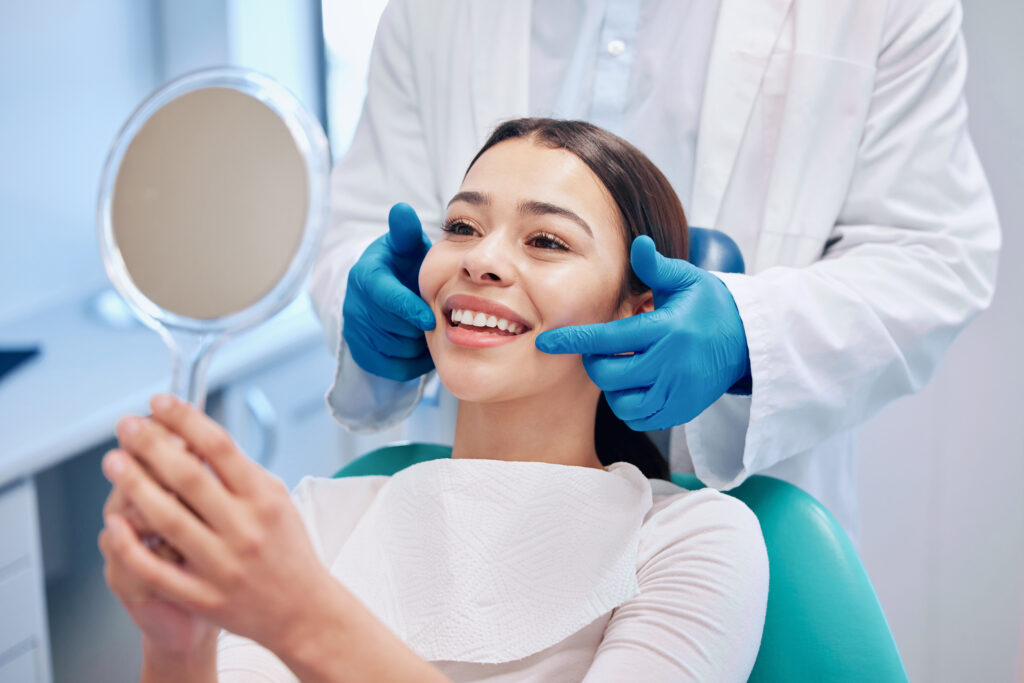
Dentist, mirror and woman check smile after teeth cleaning, braces and dental consultation. Healthcare, dentistry and happy female patient with orthodontist for oral hygiene, wellness and cleaning.
Understanding the high costs of dental treatments, we’ve taken it upon ourselves to offer high-quality dental treatments at a fraction of the price. From low-cost dental implants, bridges, veneers, to general dental treatments like tooth extractions, root canal therapy, and fillings, Perfect Pearls Dental is your go-to place for affordable dentistry in Wolverhampton.
Complimentary services
In addition to providing low-cost treatments, we also offer complimentary services to make your dental journey more comfortable. Initial consultations and dental implant consultations, typically valued at £120, are offered free of charge. Additionally, any X-rays or CT Scans required during your consultation will also be free (for in-house use).
State-of-the-art technology
Our clinic is equipped with the latest technology, including the Gendex CT scanner. This specialised dental technology creates a 3D image of your mouth, enabling our implant specialists to study your bone structure with precision. This state-of-the-art imaging allows us to plan the best possible placement of dental implants and prosthetics, ensuring successful treatments and satisfied patients.
Why choose Perfect Pearls?
In addition to offering low-cost, high-quality dental treatments, we promise a price match service for our most popular treatments. So, you can be assured that you will never overpay. With thousands of successful implant placements, our experienced team backed by both manufacturers’ and Perfect Pearls’ guarantees, ensures that you are in safe hands.
At Perfect Pearls, our primary goal is to inform you about your personal treatment options. Hence, even if you decide not to proceed with treatment post-consultation, there will be no cost.
Don’t let a dental emergency send you into panic. At Perfect Pearls Dental Implant Centres, we’re prepared to handle your urgent dental needs swiftly, professionally, and cost-effectively.
To schedule an appointment or for more information, fill out our online form or give us a call on 01902 500823.
- Home
- My teeth hurt in cold weather – should I worry?

This year, we have been experienced an unusually warm winter, however, the wind last week and clear weather over the last few days has seen many areas of the UK see the temperature dipping to/below zero for the first time – and with it, a lot of people suffering from tooth pain. So why exactly is it that your teeth hurt in cold weather and should you be worried? Our experts take a closer look.
How does low Temperature affect your teeth?
In order to understand the effects of cold weather on our teeth, we must take a moment to consider the normal conditions that our teeth experience. For almost 99% of our waking hours, our teeth sit comfortably at the ambient body temperature of 37 degrees Celsius, protected by the warmth within our mouths. Only when we eat or drink are they typically exposed to any other temperature. A sudden increase or decrease from body temperature – even barely perceptible to the skin – can cause a shock to the teeth. You may have experienced this effect when eating an ice-cream or sipping a hot coffee. Exposing your teeth to cold air from outside can have exactly the same effect.
Is there something wrong with my teeth?
Although it is quite possible your teeth hurt in cold weather purely from exposure to the low-temperature air, if you have any defects to the teeth you will be much more likely to experience extreme discomfort in cold weather. There are several common issues that may cause problems with pain in winter. Damaged fillings can allow the inner tooth to be exposed to cold air, while defective crowns or bridges which leave sensitive parts of the tooth exposed or cracks in the teeth. If you are experiencing frequent or persistent tooth pain in winter or at any time of year, then it is advisable to seek advice from your dentist.
What other oral health issues can cause tooth pain in winter?
Oral health issues that affect your teeth and/or gums can also increase seasonal tooth pain. Periodontal (Gum) disease can lead to a problem known as recessed gums, which leaves the sensitive base of the teeth exposed. If you frequently experience pain in your front teeth, which often have direct exposure to cold air, this may be the cause. Infections in your teeth and gums can also exaggerate the effects of low temperatures, as can cavities in the teeth – even if they are relatively small. Because teeth are porous, any surface damage can cause high levels of pain as cold air penetrates to the more sensitive layers.
Gaps and Fillings
Gaps caused by missing teeth and large fillings can also be very problematic at this time of year. A missing tooth can leave the inside edges of the teeth around it exposed to low temperatures, whilst large metal fillings can become very cold and affect the surrounding tooth. If you have a gap, we would advise you to consider dental implants as an option. Dental implants are suitable for almost every patient and allow your missing tooth to be replaced with a crown that looks and feels just like your natural teeth, without having an impact on any of the surrounding, healthy teeth.
Should I have a dental check-up?
Any discomfort or pain in your teeth when going outside in cold weather is a sign that your teeth and gums may be in need of attention and it is advisable to contact your dentist to book a check-up. Even if you are prone to sensitive teeth, do not assume that it is simply the cold and nothing more.
Perfect Pearls are proud to be able to offer completely free consultations to help make people aware of their treatment solutions. A range of treatments for problems such as implants to replace missing teeth and root canal treatment at some of the lowest prices in the UK are available to help. With a highly experienced team and access to the very best in equipment, our conveniently located clinic is easily accessible from most areas of the UK. Why wait and suffer this winter – call us now on 01902 500823 or contact us online for a quick response.
- Home
- Mouth Cancer – what is it and why does it matter?

Next month, British Charity the Oral Health Foundation will once again be running their annual Mouth Cancer Action Month. Although the annual campaign officially runs throughout November, the organisation is keen to get the message out to as many people as possible and remind people that mouth cancer is something we should be aware of all year round.
What is mouth cancer?
The definition of mouth cancer is any form of cancer that affects the mouth. This may include the lips, tongue, cheeks and throat. Mouth cancer can appear in different forms and can affect any or all parts of the mouth. It is a dangerous disease that can and does cost lives.
What causes mouth cancer?
Tobacco and alcohol are by far the most significant factors in mouth cancer. Cigarette, cigar and pipe smoking are the main forms of tobacco use in many parts of the world and can all dramatically increase the likelihood of developing the disease. As well as smoking, consumption of alcohol also increases the risk of mouth cancer. The risk is even greater for those who use tobacco and alcohol together.
Like the rest of your skin, UV radiation from the sun can also have an impact. Over-exposure to sunlight increases the risk of cancer of the lips.
Another key risk factor that has been identified more recently is human papillomavirus (HPV). HPV is the main cause of cervical cancer and affects the skin that lines the moist areas of the body. It is now understood that HPV can be spread through oral sex, and according to the latest research HPV could soon rival smoking and drinking as one of the main causes of mouth cancer.
Although many people get HPV during their lives and for many this does not cause a problem. Action is, however, being taken to help reduce this risk. HPV vaccines for both girls and boys are now being introduced as routine, which is likely to help reduce the rates of mouth cancer.
Mouth cancer in numbers
Figures published by the Oral Health Foundation show that mouth cancer is a serious health issue in the United Kingdom. More than 8,300 people in the are now diagnosed with mouth cancer every year – an increase of almost 50% in the last decade.
Sadly, mouth cancer also claimed 2,722 lives in the UK last year. Many of these deaths occurred because the disease was caught too late – making it more important than ever to spread the message and help give people a better chance of survival.
How can I recognise mouth cancer?
Knowing the signs of mouth cancer and taking early action is one of the key messages of Mouth Cancer Action Month. The Oral Health Foundation is using the campaign to encourage everyone to be aware of any unusual changes in the mouth and know what to do if anything out of the ordinary is noticed – being Mouthaware.
According to Chief Executive Dr Nigel Carter OBE: “The first line of defence against mouth cancer is yourself. Being able to identify mouth cancer at an early stage is vital for you being able to beat it.”
He recommends that everybody checks their mouths regularly, paying particular attention to mouth ulcers that do not heal within three weeks. People should also be aware of other possible signs of mouth cancer such as red and white patches in the mouth or lumps and swellings in the head and neck.
“If you spot something that doesn’t look normal, take action. If in doubt, get checked out by your dentist or doctor. The decision could save your life.”
“Mouth Cancer Action Month is all about learning more about mouth cancer. It’s the perfect opportunity to start checking your mouth at home and rethinking some of the things that might put you at greater risk.”
At Perfect Pearls, checking your mouth for cancer forms part of our FREE consultation service so as well as receiving bespoke personal treatment options, you can be secure in the knowledge your mouth has been checked for any signs of anything that may cause concern.
For more information, including advice and information on how to spot risk factors and common signs and symptoms, as well as learning about the stories at the heart of the campaign, visit www.mouthcancer.org.
If you have any questions or concerns about your oral health, the team at Perfect Pearls is happy to advise. Call us today on Wolverhampton 01902 500 823.
This article is adapted from https://www.dentalhealth.org/news/charity-announces-launch-of-mouth-cancer-action-month-2019
- Home
- Should I invest in an electric toothbrush?
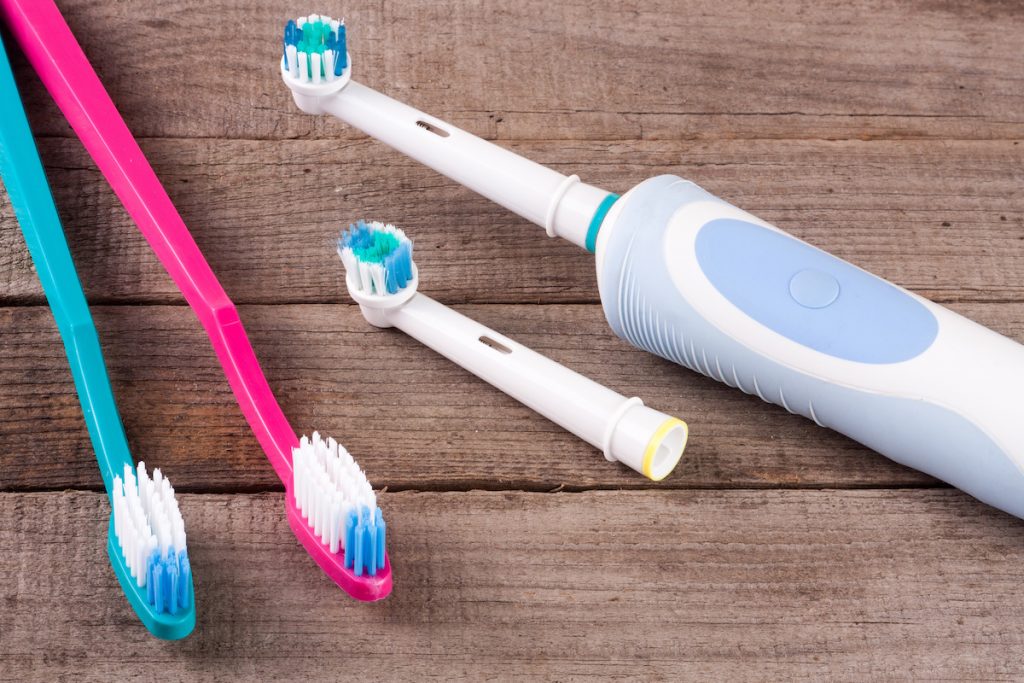
If you have invested in your smile or simply care about your teeth and oral hygiene in general, you may well have found yourself wondering whether it is also worth investing in an electric toothbrush. No doubt you’ve seen the promises of brighter, whiter smiles in the many television adverts. But are they really what they are made out to be? Now, for the first time, scientists have been able to resolve the question conclusively. After a groundbreaking 11-year research project conducted for the Oral Health Foundation, the UK’s leading oral health charity and a globally recognised leader in the field, scientists have now published their official findings. We take a closer look at what they discovered.
The electric toothbrush – a brief background
The electric toothbrush was invented all the way back in 1926. The earliest model was first produced in the USA. Despite the invention dating back so far, it was only in the post-war economic boom of the 1950’s that the electric toothbrush really took off as a popular household item. There were, however, issues connected to practicality and safety. Unlike today’s designs, early electric toothbrushes needed to be plugged in during use and ran at mains voltage!
In 1961, the General Electric corporation introduced the rechargeable, battery-powered electric toothbrush that we are now familiar with to the market. It was in the 1980’s, as a result of the Gillette group acquiring the Oral-B brand to go along Braun that sales of electric toothbrushes really began to take off in the UK.
Electric vs manual toothbrushes – the numbers
The impartial research set out to settle the argument of electric vs manual toothbrushes conclusively. These were some of their key findings:
- Less than half (49%) of British adults currently use an electric toothbrush
- Almost two thirds (63%) of electric toothbrush users say that more effective cleaning is their reason behind the switch
- More than a third (34%) of users have been persuaded to buy one because of the advice of a dentist
- Around one in nine (13%) people have received an electric toothbrush as a gift.
The benefits of an electric toothbrush
The research team found strong evidence that people who use an electric toothbrush generally benefit from healthier gums, less tooth decay and also keep their teeth for longer, compared with those who use a manual toothbrush.
Dr Nigel Carter OBE, Chief Executive of the Oral Health Foundation, sheds some light on why this is the case –
“Health experts have been speaking about the benefits of electric toothbrushes for many years. This latest piece of evidence is one of the strongest and clearest yet. Electric toothbrushes are better for our oral health.
“Electric toothbrushes, especially those with heads that rotate in both directions, or ‘oscillating’ heads, are really effective at removing plaque. This helps keep tooth decay and gum disease at bay.
“As the science behind the advantages of electric toothbrushes is mounting, the decision of whether to invest in one becomes much easier.”
Supporting these findings, researchers from the Journal of Clinical Periodontology found that electric toothbrushes resulted in 22% less gum recession and 18% less tooth decay over the 11-year period.
Why your oral hygiene regime matters
Despite the findings, Dr. Carter was keen to emphasise that there is no substitute for having a good oral hygiene routine. This is regardless of whether you prefer to use a manual or electric toothbrush.
“Whether you’re using a manual or electric toothbrush you should be brushing for two minutes, twice a day, with a fluoride toothpaste. Also, a good oral health routine would not be complete without using an interdental brush or floss once a day.
“If you follow a good oral health routine then whether you use a manual or electric toothbrush, you’ll have a healthy mouth either way.”
Dialogue with your dentist
Ultimately, this completely unbiased research has shown that an electric toothbrush can offer genuine benefits as part of a broader oral health routine. This is especially in conjunction with regular dental visits in which you can discuss your oral health.
Dr. Sanjeev Ramrakha, Perfect Pearls Clinical Director says:
“ I always recommend having an electric tooth brush as part of your ‘dental armour’.
A Manual toothbrush, allows one to go back to basics and keep focused on technique, whilst the Electric Toothbrush ensures a two brushing minute regime and is proven to be more effective on plaque removal.
I also think a water-pik is an essential tool for heavily restored teeth and implant cases for ongoing maintenance and care.”
To get in touch with the team at Perfect Pearls today, call now on Wolverhampton 01902 500 823.
Source: https://www.dentalhealth.org/news/electric-toothbrushes-win-the-head-to-head-against-manual-in-record-breaking-new-study
- Home
- Healthy Teeth – The Benefits of Berries

New research just published by leading British charity the Oral Health Foundation, has discovered that dark-coloured berries may play a key role in fighting tooth decay. A valuable source of antioxidants, fresh fruit and vegetables have long been known to contribute to a healthy diet and help in the fight against diseases such as heart disease and cancer. Now, a new study has discovered that dark-coloured berries in particular may have significant benefits for your oral health. Here’s what the scientists had to say.
Benefits of dark coloured berries
It is now known that eating just a handful of dark-coloured berries such as cranberries and blueberries every day may significantly lower the risk of tooth decay. The exciting discovery was made in a study that was conducted in 2018 and first published this year. Dr Nigel Carter OBE, Chief Executive of the Oral Health Foundation, explains:
“Cranberries seem especially good for our oral health, as their polyphenols stick around in our saliva and will continue to help our mouth, even after we’ve swallowed them. What is especially exciting is that these natural extracts are completely sugar-free. This means they can be added to oral care products in several ways. They can dissolve in water so can be used to create healthy drinks, as well as to reformulate unhealthy drinks packed full of sugar.”
How do polyphenols help our teeth?
The protective power of dark coloured berries is thanks to substances they contain that are called polyphenols. Polyphenols are a naturally occurring compound that appears in high concentrations in berries such as cranberries and blueberries.
Polyphenols help to protect our teeth by preventing ‘bad bacteria’ from sticking to the teeth and gums. The polyphenols present in berries are now known to be particularly effective against a strand of bacteria responsible for accelerating tooth decay.
As a result, polyphenols help to reduce tooth decay, plaque and gum disease.
The future of dental products?
Of course, chewing a handful of berries every day may not seem like an attractive addition to your oral hygiene routine. However, Dr Carter is confident that this will not be necessary for us to enjoy the benefits of this new discovery.
“These substances could also have wider applications for tooth decay prevention and control. Mouthwash could benefit from this ingredient, as could toothpastes. More testing must be done but it will be extremely interesting to see whether manufactures make more use of polyphenols in the future.”
Fruit sugars – a word of caution
Although the research has established the potential benefits of eating berries on a daily basis, caution should still be exercised as berries also have potential harmful effects on your teeth. Like other fruits, berries may also contain high amounts of natural sugar.
The current recommended daily allowance (RDA) of sugar for an adult is 90 grams or 22.5 teaspoons per day. This includes 60 grams of natural sugar and 30 grams of added sugar. One portion of cranberries contains up to four grams of natural sugar (equivalent to one teaspoon) while a serving of blueberries is nearly ten grams.
“It is important to remember that whole fruit contains natural sugars,” notes Dr Carter. “This means it can still cause a risk to teeth when consumed in high amounts and too often.
“It is best to eat fruit at mealtimes like breakfast, or straight after dinner. This will limit the number of times which our mouth is exposed to sugar and acid.”
Unhappy with your teeth? Interested in exploring the options available to you? Get in touch with the award winning Perfect Pearls team today and discover how easily you could restore your smile. Call us on Wolverhampton 01902 500 823 or use our online service for more options.
Source: https://www.dentalhealth.org/news/cranberries-and-blueberries-why-certain-fruit-extracts-could-provide-the-key-to-fighting-tooth-decay
- Home
- Why Does Mouth Cancer Matter?
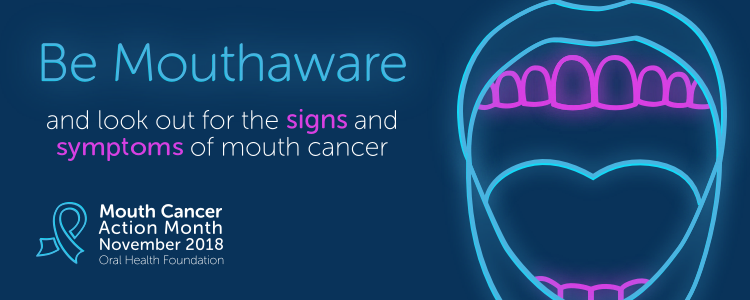
This November, dentists and other healthcare professionals all over the UK are joining forces for Mouth Cancer Action Month. It is an annual initiative that is run by the UK charity, the Oral Health Foundation, and hopes to raise awareness about the dangers of mouth cancer, as well as help people to understand the causes and symptoms. So what exactly is mouth cancer and why does it matter? We take a closer look.
Mouth cancer – a growing cause for concern
In the UK, an alarming 8,300 people-a-year are now diagnosed with mouth cancer – a 49% increase compared to a decade ago and 135% compared with 20 years ago. This makes it one of the few types of cancers that is not showing any signs of decline. The seriousness of the disease is shown by figures which also reveal that 2,722 Brits lost their life to mouth cancer last year. For those diagnosed with the disease, the 10-year survival rate is between 19% and 58%, depending on where the cancer strikes and how early it is identified.
Understanding mouth cancer
The research, published by the Oral Health Foundation and Simplyhealth Professionals to coincide with November’s Mouth Cancer Action Month, discovered that there was severe lack of awareness when it comes to mouth cancer, including understanding the main risk factors as well as being aware of the signs and symptoms.
Just under half (45%) of British adults admitted to not having any understanding about mouth cancer. Three in four (75%) said they did not know the symptoms while more than four in five (82%) did not know where mouth cancer appears. Now, it is more important than ever that people become more aware of mouth cancer – and that is what Mouth Cancer Action Month is all about.
What causes mouth cancer?
As with most cancers, the biggest risk factors for mouth cancer are smoking and drinking alcohol to excess. Another increasingly common cause, however is the human papillomavirus (HPV) which is now known to be transmitted through oral sex. Another significant cause of mouth cancer is poor diet.
It is important to bear in mind, however, that mouth cancer can affect anybody, meaning it is vitally important to recognise the symptoms.
Do dental implants increase my risk of mouth cancer?
There is no evidence to suggest that dental implants are in any way associated with a higher risk of mouth cancer. Although there have been limited studies, in depth research conducted in 2012 by the US National Institute of Health found no correlation between implant surgery and cancer.
Generally speaking, the benefits of dental implants far outweigh any cause for concern. If you do have any questions or fears, your implantologist will be happy to discuss these with you.
What are the symptoms of mouth cancer?
The early warning signs of mouth cancer that people should look out for are:
- mouth ulcers that last longer than three weeks
- red or white patches
- unusual lumps and swellings
The disease can appear in the mouth, lips, head and neck. If you become aware of any of these symptoms, it is important that you get an examination by a dentist as soon as possible. Patients should never be afraid to seek advice or put off booking an appointment if they have any concerns.
Dentists – the first line of defence
Although it is important to look out for the signs and symptoms of mouth cancer as part of your regular oral hygiene routine, one of the best ways to ensure that mouth cancer can be spotted, diagnosed and treated at the earliest possible stage is to ensure you have a regular dental examination.
It may not always be easy to see symptoms yourself, depending where they occur, and some are not easy to distinguish for the untrained eye. Your dentist is trained in what to look for, and will check for any symptoms of mouth cancer as part of your regular examination any time they see you – including at our complimentary consultations. They’ll also be able to examine parts of the mouth that you are unable to see yourself. Early diagnosis gives you the best possible chance of survival. Ensuring you attend your regular checkups will not just help to save your teeth – it could save your life.
To find out more about Mouth Cancer Action Month and learn more about the disease, visit the official website.
If you have any questions or concerns about mouth cancer or would like to book an appointment or enquire about becoming a member today, call now on Wolverhampton 01902 500823.
- Home
- Smoking and the effects on your dental implants
Smoking is one of the highest causes of implant failure. This is due to the effects of nicotine and the smoke itself.
Nicotine – constriction of blood vessels, which slows healing
Chemicals – greater susceptibility to infections
A slower healing process
The longer it takes for the surrounding bone to heal around the implant, the higher the chances of infection or early implant loss.
Nicotine replacements also cause a slower healing process, but with a lower chance of infection from the tobacco chemicals.
What are my options?
- Quit smoking – the best option everytime
- Take a break – (Stop for 2 weeks before and 2-3 months after)
- Nicotine Replacement – (Vaping, patches, chewing gum)
- Cut down – The less the better.
We always recommend quitting smoking!

